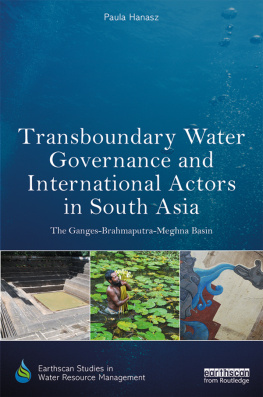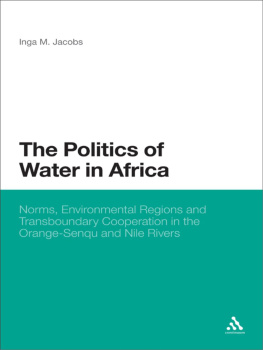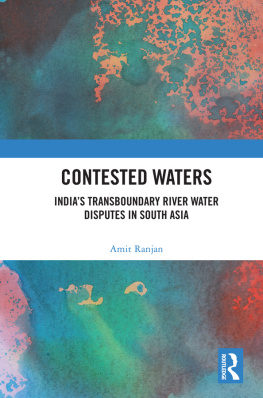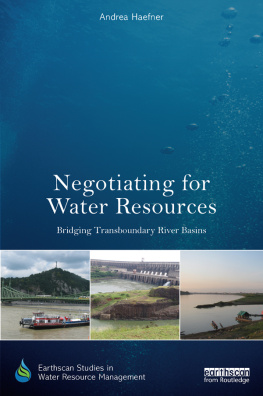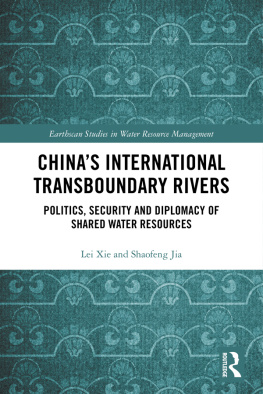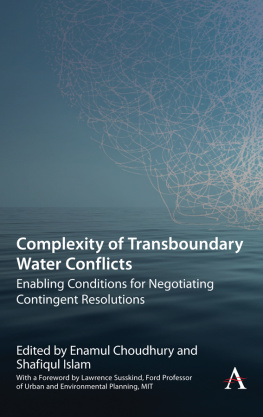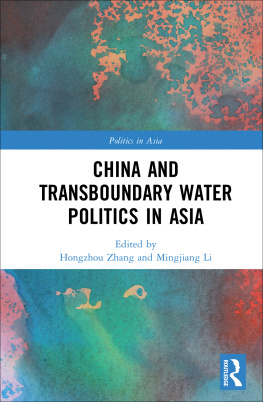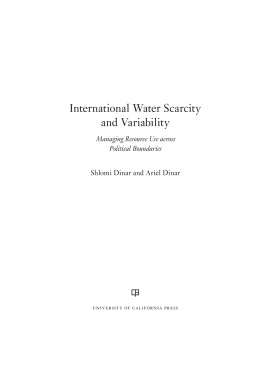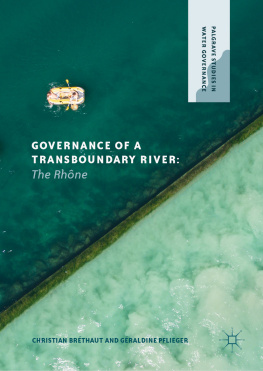Paula Hanasz not only provides a very careful analysis of factors responsible for lack of effective cooperation in the Ganges-Brahmaputra-Meghna basin among the riparian countries, but also suggests some thoughtful ways forward. Anyone interested in transboundary water governance in South Asia will treasure this book.
Ashok Swain, Dept of Peace and Conflict Research,
Uppsala University, Sweden
Transboundary Water Governance and International Actors in South Asia
International organisations such as the World Bank began to intervene in the transboundary water governance of the GangesBrahmaputraMeghna river basin in the mid-2000s, and the South Asia Water Initiative (SAWI) is its most ambitious project in this regard. Yet neither SAWI nor other international initiatives, such as those of the Australian and UK governments, have been able to significantly improve transboundary water interaction between India, Nepal, Bhutan and Bangladesh.
This book identifies factors that contribute to water conflicts and that detract from water cooperation in this region. It sheds light on how international organisations affect these transboundary water interactions. The book discusses how donor-led initiatives can better engage with transboundary hydropolitics to increase cooperation and decrease conflict over shared freshwater resources. It is shown that there are several challenges: addressing transboundary water issues is not a top priority for the riparian states; there is concern about Indias hydro-hegemony and Chinas influence; and international actors in general do not have substantial support of the local elites. However, the book suggests some ways forward for improving transboundary water interaction. These include: addressing the political context and historical grievances; building trust and reducing power asymmetry between riparian states; creating political will for cooperation; de-securitising water; taking a problemshed view; strengthening water sharing institutions; and moving beyond narratives of water scarcity and supply-side solutions.
Paula Hanasz has completed a PhD at the Australian National University, Australia. She consults on issues of defense, national security and non-traditional security threats.
Earthscan Studies in Water Resource Management
Water, Knowledge and the Environment in Asia
Epistemologies, practices and locales
Edited by Ravi Baghel, Lea Stepan and Joseph K.W. Hill
Community Management of Rural Water Supply
Case studies of success from India
Paul Hutchings, Richard Franceys, Stef Smits and Snehalatha Mekala
Drip Irrigation for Agriculture
Untold stories of efficiency, innovation and development
Edited by Jean-Philippe Venot, Marcel Kuper and Margreet Zwarteveen
Water Policy, Imagination and Innovation
Interdisciplinary approaches
Edited by Robyn Bartel, Louise Noble, Jacqueline Williams and Stephen Harris
Rivers and Society
Landscapes, governance and livelihoods
Edited by Malcolm Cooper, Abhik Chakraborty and Shamik Chakraborty
Transboundary Water Governance and International Actors in South Asia
The GangesBrahmaputraMeghna basin
Paula Hanasz
The Grand Ethiopian Renaissance Dam and the Nile Basin
Implications for transboundary water cooperation
Edited by Zeray Yihdego, Alistair Rieu-Clarke and Ana Cascao
Freshwater Ecosystems in Protected Areas
Conservation and management
Edited by Max C. Finlayson, Jamie Pittock and Angela Arthington
For more information and to view forthcoming titles in this series, please visit the Routledge website: www.routledge.com/books/series/ECWRM/
Transboundary Water Governance and International Actors in South Asia
The GangesBrahmaputraMeghna Basin
Paula Hanasz
First published 2018
by Routledge
2 Park Square, Milton Park, Abingdon, Oxon OX14 4RN
and by Routledge
711 Third Avenue, New York, NY 10017
Routledge is an imprint of the Taylor & Francis Group, an informa business
2018 Paula Hanasz
The right of Paula Hanasz to be identified as author of this work has been asserted by her in accordance with sections 77 and 78 of the Copyright, Designs and Patents Act 1988.
All rights reserved. No part of this book may be reprinted or reproduced or utilised in any form or by any electronic, mechanical, or other means, now known or hereafter invented, including photocopying and recording, or in any information storage or retrieval system, without permission in writing from the publishers.
Trademark notice: Product or corporate names may be trademarks or registered trademarks, and are used only for identification and explanation without intent to infringe.
British Library Cataloguing-in-Publication Data
A catalogue record for this book is available from the British Library
Library of Congress Cataloging-in-Publication Data
A catalog record for this book has been requested
ISBN: 978-1-138-09754-4 (hbk)
ISBN: 978-1-315-10483-6 (ebk)
Typeset in Goudy
by Out of House Publishing
First and foremost, I would like to thank everyone who made the time and effort to speak with me about the hydropolitics of the GangesBrahmaputaMeghna basin over the years, and especially during my PhD fieldwork in 2014. Some people preferred to remain anonymous, but my heartfelt thanks goes out to them, as well as to: Ajaya Dixit, Amita Bhaduri, Anjal Prakash, Anumita Raj, Arunabha Ghosh, Ashok Swain, Bill Young, Brian Cook, Bushra Nishat, C. Raja Mohan, David Grey, David Molden, Dhaval Desai, Dipak Gyawali, Doug Hill, Dunu Roy, Gareth Price, Gary Jones, Golam Rabbani, Hamsa Iyer, Himanshu Thakkar, John Dore, Joydeep Gupta, Mandakini Devasher Surie, Mihir Bhonsale, Pranab Kumar Ray, Ramaswamy R. Iyer, Ramesh Bhushal, Rishi Aggarwal, Rohan DSouza, Russell Rollason, Ryan Thew, S. Vishwanath, Sabita Kaushal, Sagar Prasai, Samir Saran, Shafiqul Islam, Shawahiq Siddiqui, Shawn Novel, Sonali Mittra, Srinivas Chokkakula, Sujeev Shakya, Tahira Syed and Tira Foran.
For their friendship, advice and support in the world of transboundary water studies, I would like to thank: Florian Krampe, Francesco Sindico, James Bond, Kevin Wheeler, Marian Neal (Patrick), Mark Zeitoun, Naho Mirumachi, Peter Mollinga, Rebecca Peters, Remy Kinna and Rozemarijn ter Horst. Thanks also to Daniel Connell.
This book would not have been possible without the tireless support and encouragement of Tim Hardwick, Amy Johnston and the rest of the wonderful team at Routledge/Earthscan. Thank you all!
| ADB | Asia Development Bank |
| ADD | Abu Dhabi Dialogue |
| ADDG | Abu Dhabi Dialogue Group |
| AIIB | Asia Infrastructure Investment Bank |
| AusAID | Australian Agency for International Development (part of DFAT since 2013) |
| AWP | Australian Water Partnership |
| bcm | billion cubic metres |
| CEEW | Council on Energy, Environment and Water |
| CSIRO | Commonwealth Scientific and Industrial Research Organisation (Australia) |
| DFAT | Department of Foreign Affairs and Trade (Australia) |

